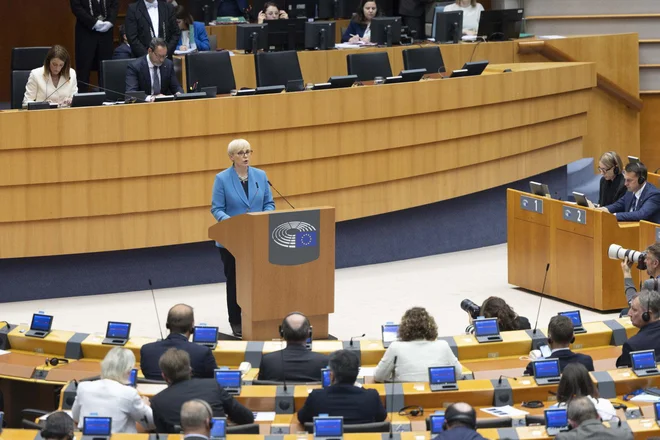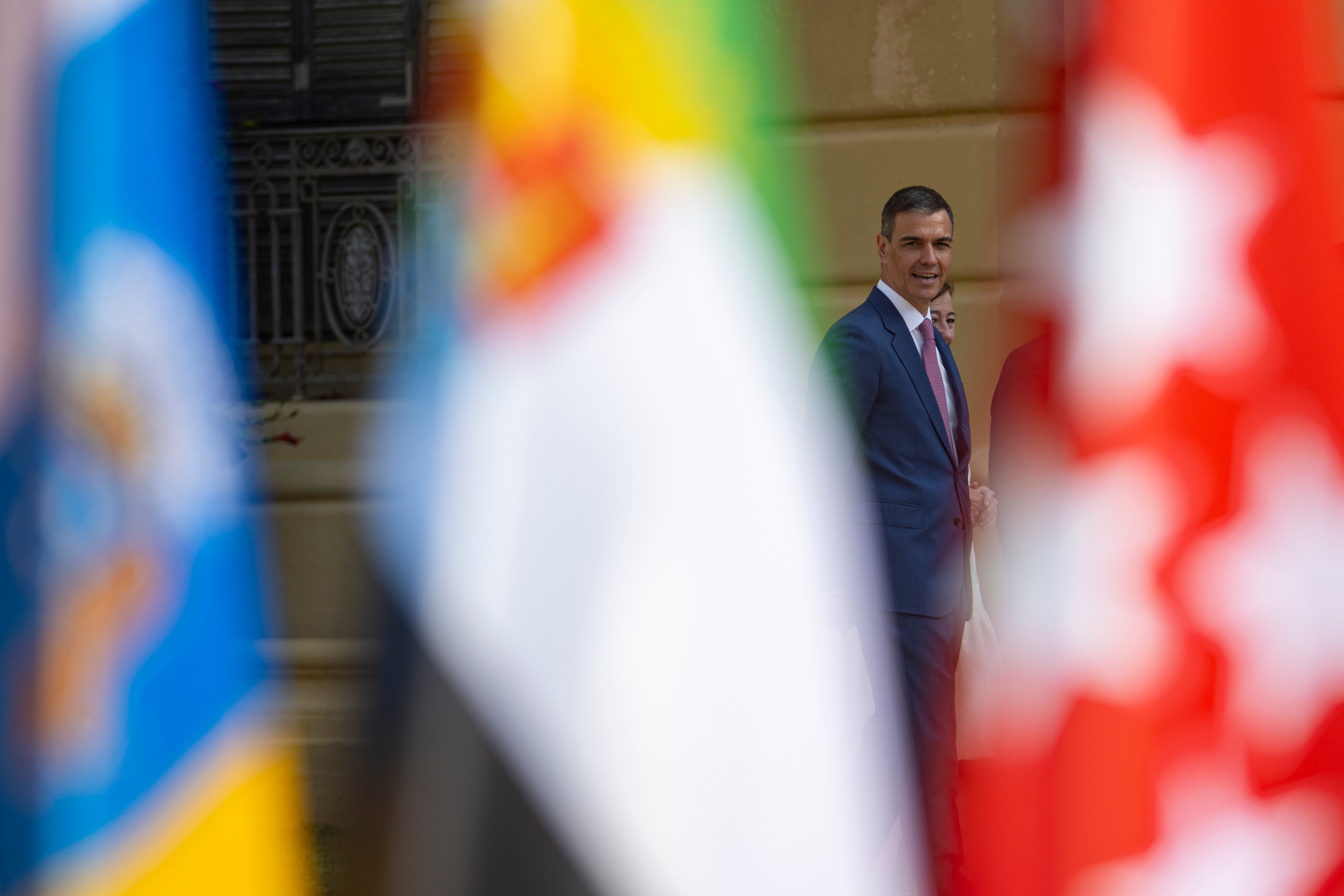It is precisely during the night hours that it is possible in political The Hague. « This is crazy work! »
/s3/static.nrc.nl/images/gn4/stripped/data130957210-f290a8.jpg|https://images.nrc.nl/5HXCRFHU28AF2v1GJcry0yMRlOo=/1920x/filters:no_upscale()/s3/static.nrc.nl/images/gn4/stripped/data130957210-f290a8.jpg|https://images.nrc.nl/oE9auaBGupVZfW-kNO3odYa-J20=/5760x/filters:no_upscale()/s3/static.nrc.nl/images/gn4/stripped/data130957210-f290a8.jpg)
« What a beautiful and nocturnal struggle for the existence of people! » written NSC negotiator Nicolien van Vroonhoven on Wednesday morning on X. Just before, the four negotiating coalition parties PVV, VVD, NSC and BBB had reached an agreement on the Spring Memorandum, after more than 24 hours of continuous negotiation. On the selfie she placed, together with co -negotiator Folkert Idsinga, they look into the lens laughing but clearly tired.
For a politician it often has something heroic: negotiating until well into the night. Going to the utmost for your supporters, the opponent with details, stay sharp while the other is becoming sleepy. Also for the outside world there is « an element of romance » in political « nights, » says political historian Anne Bos, affiliated with Radboud University Nijmegen. « That is why so many people still remember the Night of Schmelzer (1966) or De Nacht van Wiegel (1999). » The cabinet fell (temporarily) in both nights.
Photo Phil Nijhuis/Dutch height
But it is precisely those nights, with their dramatic outcome, to prove that it can spoken in The Hague after midnight. And that it is very unwise by talking if the fatigue strikes. Negotiators get tired, they want to go home. They become erratic, faster emotional. They can no longer concentrate, make mistakes. « This is crazy work! », Member of Parliament Wttewaall van Stoetwegen (CHU) proclaimed in 1970, after another night session.
Atmosphere of distrust
Psychologist and negotiating expert Tim Masselink saw in recent weeks with surprise « how unprofessional it was going » in The Hague. « Good negotiators never make it arrive at the last minute. » The party leaders had weeks to reach an agreement on the Spring Memorandum, but waited to negotiate until the last minute. A reason for that procrastination: the mutual atmosphere is bad, the party leaders distrust each other. In addition, says Masselink: Really good negotiators are rare in politics. « Politicians are usually good at debating. I am in the right place and you are wrong. But good negotiation means: getting something done together. »
How long you talk and when you let the sandwiches come, suddenly become strategic choices
How politicians get through the negotiations differs from person to person. The one can be worse against little sleep than the other, or gets a hungry. The then Prime Minister Mark Rutte (VVD, 2010-2023) called that ‘negotiation fitness’, says Tim Masselink. « How long you talk, and when you let the sandwiches come, suddenly become strategic choices, » he says.
Lack of sleep is one Badge of Honor In politics. Politicians are happy to create it. Napoleon, Winston Churchill and Bill Clinton were known for being able to work with little night’s sleep.
But social-psychological research shows that factors that intervene on motivation to process information have a strong negative influence on negotiations. Bianca Beersma, professor of organizational sciences at the Free University refers to how research shows that such factors – such as time pressure and sleep deprivation – reduce the ability to process complex information and understand the other. In short, everything happens at the same time: the cognitive level of the individual is decreasing, the politician forgets figures, gets together, does not come on words, or, worse: forget why he or she was already there again.
Also, and that is crucial in politics, the social skills and the ability of someone else to learn quickly. Politicians tend to admit much faster, or to hold stubbornly to an untenable position. This makes it more difficult to reach a compromise. The German social psychologist Jan Häusser (Göttingen) did in a scientific article about lack of sleep in 2017 a call To voters: « Investigate why a political decision was made at night. Was there really an objective necessity, or was it more a message to you? »
The Ayaan debate
A notorious example was the Night of Ayaan, from 28 on June 29, 2006. Minister Rita Verdonk (VVD) staggered in a parliamentary debate that dragged on hour after hour, because she wanted to take the Dutch passport of MP and party colleague Ayaan Hirsi Ali. Verdonk seemed to survive through a soothing statement in which Hirsi Ali regrets about the issue. Premier Balkenende (CDA), no night person, made a big mistake. He said about the explanation that it was stated in such a way that Verdonk could « live with it. » Coalition party D66 was so angry that it moved support to the second Balkenende cabinet. A day later the cabinet had fallen.
/s3/static.nrc.nl/images/gn4/stripped/data130957157-16c4ac.jpg|https://images.nrc.nl/RLuqH7TFJE6cDAgo_mwEDe6Wskk=/1920x/filters:no_upscale()/s3/static.nrc.nl/images/gn4/stripped/data130957157-16c4ac.jpg|https://images.nrc.nl/IDDVKDEWp9H5iDnnjQlTmo50c9c=/5760x/filters:no_upscale()/s3/static.nrc.nl/images/gn4/stripped/data130957157-16c4ac.jpg) Minister Rita Verdonk addresses the press after the second parliamentary debate about the withdrawal of the Dutch nationality of Ayaan Hirsi Ali.
Minister Rita Verdonk addresses the press after the second parliamentary debate about the withdrawal of the Dutch nationality of Ayaan Hirsi Ali.
Photo Vincent Jannink/ANP
« The biggest political accidents happen in the night, » says former MP and journalist Jan Schinkelshoek (CDA). « That is why nocturnal negotiations have been less common in recent years. » According to Schinkelshoek, the fact that the coalition parties of the Schinkelshoek Cabinet nevertheless chose two things: Processing behavior due to the poor proportions, or « pure political theater » for the supporters.
Until the ‘morning cherries’
Anyway, says Schinkelshoek, it is unwise. « In the time of Prime Minister Joop den Uyl (1973-1977) it happened constantly. Den Uyl functioned well in the night, and used it as a political weapon. He continued until the morning circles, as ministers Ruud Lubbers and Jan Pronk lay on the ground of fatigue. Then he could strike and get his way. »
But Den Uyl also soon noticed the disadvantages. The formation of his second cabinet failed in 1977, partly because the relationships with the CDA derailed during the night hours. Schinkelshoek: « It was a total exhaustion battle. We saw journalists explaining the negotiators in the morning with dead -hard faces why it had failed. The conversations had taken deep tracks. They were completely bored with each other. »
As Prime Minister (between 1982 and 1994), Lubbers never wanted to meet late. His successors Kok and Balkenende also hated it.
/s3/static.nrc.nl/images/gn4/stripped/data130957092-78cc1a.jpg|https://images.nrc.nl/IRV5D3cCM8SiNTiZlSx_K2BgjpA=/1920x/filters:no_upscale()/s3/static.nrc.nl/images/gn4/stripped/data130957092-78cc1a.jpg|https://images.nrc.nl/wSJs6Sr4MRlou7xCBn0ZeO0UiVk=/5760x/filters:no_upscale()/s3/static.nrc.nl/images/gn4/stripped/data130957092-78cc1a.jpg)
Photo Bart Maat
Mark Rutte used his negotiation fitness as a weapon.
The more unstable the coalition, the greater the chance of nocturnal meetings, says political historian Anne Bos. « That is a parallel between now and the age of Uyl. Few agreements have been made in advance, the coalition agreement of these four parties is not tight. The parties still have to bridge large distances. We are looking at a deferred cabinet formation. »
Read also
After long negotiations, coalition reaches the spring memorandum

:format(webp)/s3/static.nrc.nl/wp-content/uploads/2025/04/16112145/web-1604BIN_Wilders.jpg)
/s3/static.nrc.nl/wp-content/uploads/2025/06/07043854/ANP-426099410.jpg)
/s3/static.nrc.nl/images/gn4/stripped/data133212332-41b949.jpg)
:format(webp)/s3/static.nrc.nl/images/gn4/stripped/data133314127-765aec.jpg)



